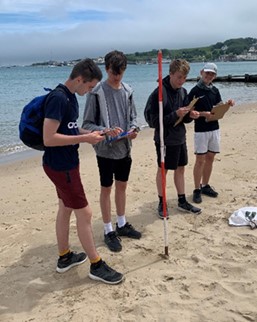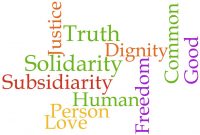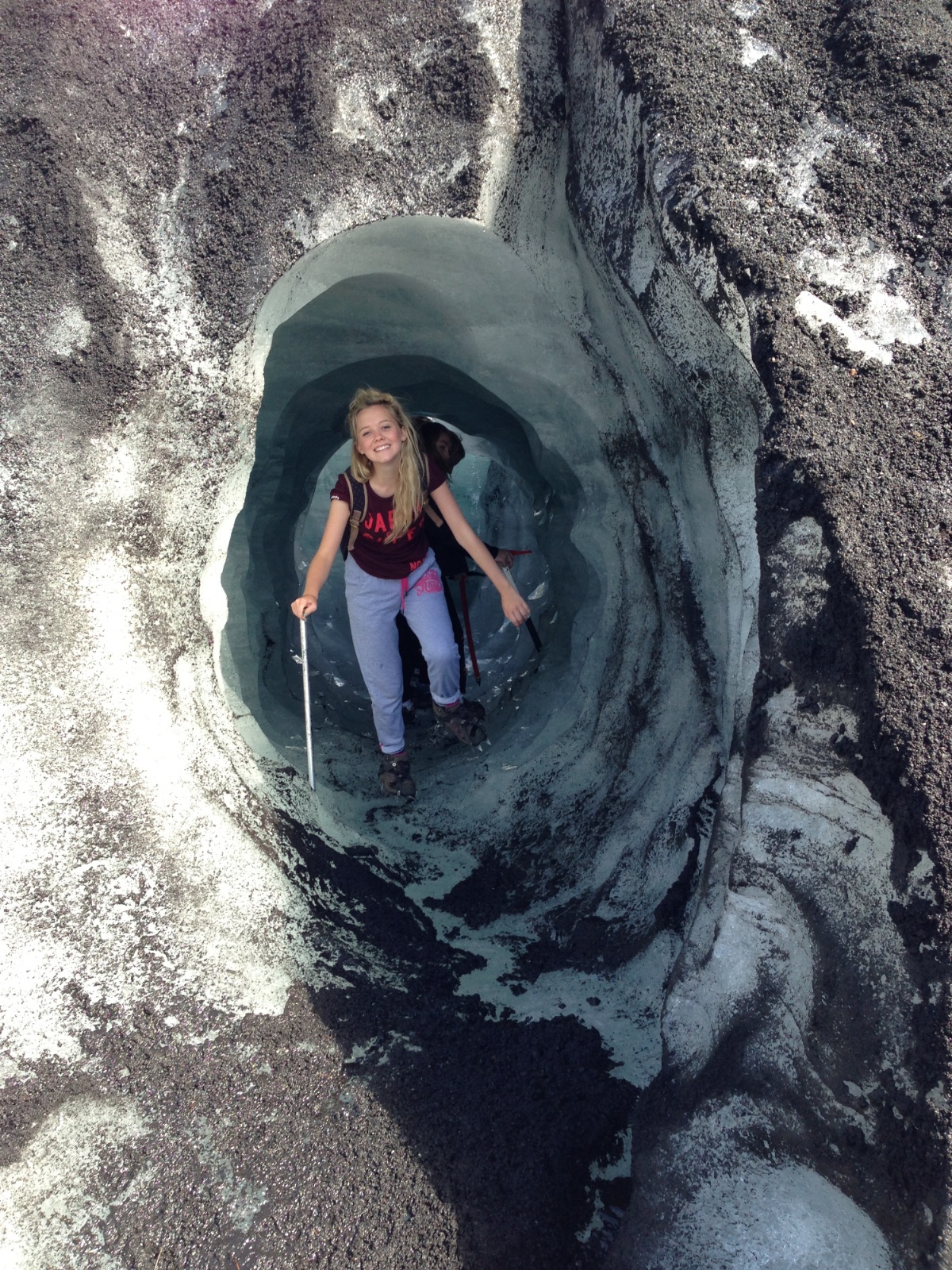Department: Geography
Head of Department: Mrs U Broadway
If you wish to learn more about the curriculum, please contact the Head of Department by email: u.broadway@oaklandscatholicschool.org
If you wish to learn more about the curriculum, please contact the Head of Department by email: u.broadway@oaklandscatholicschool.org
Collaborative curriculum planning lies at the heart of what we do in the department. Our curriculum draws from the breadth of geographical concepts and ensures that students learn this in sufficient depth. The department regularly meets to evaluate and revise the curriculum content to ensure that it builds on students’ prior learning and re-vists the main concepts.
Fieldwork remains a key component of the curriculum, this commences in KS3. The complexity of this increases in year 10 where students take part in a compulsory fieldtrip to West Wittering and East Wittering, where they complete a mixture of physical and human data collection tasks. Students also have an opportunity to take part in an optional geography fieldtrip to Iceland. Field work increases independence in students and prepares them for NEA investigations at KS5.

Homework is an important part of the learning process and is set once a week for all classes. It includes a mixture of recall tasks, Geography in the News reading activities and revisions.
Whilst a student’s journey in school is broken into Key stages, we believe that the knowledge and skill developed in KS3 should not be seen in isolation to that developed at later stages. All that is learned in every key stage provides important building blocks to ensure success in later life.
Teachers revisit content taught previously in order to introduce new, more complex knowledge to deepen students’ understanding (Geog. your memory tasks). For example, in Year 7 students learn about the global atmospheric circulation and in year 8 about the location of hot and cold deserts, followed by climatic hazards in Year 9.
Geography curriculum includes the most appropriate examples and case studies to demonstrate each aspect being learned. These are always real, relevant to the content and support students to see the dynamic and interconnected nature of Geography. We try to avoid portraying a ‘single story’ by looking at places from various perspectives and discussing a range of topics e.g The Middle East Unit not focusing on war and oil but hot deserts landscapes or Africa – a continent of opportunities and challenges?
Key Stage 3
Throughout Key Stage 3 classes are taught in mixed ability tutor groups with all students following the same programme of study with differentiation built into lessons to allow all to access the curriculum as fully as their needs require. We want to instil a passion for geography in all students; this is our primary aim as well as using KS3 as a platform for progression into KS4 and KS5. To ensure consistency all topics have a full scheme of work with PowerPoints, worksheets, video links that can be tailored to the teaching groups.
Key Stage 4
All students can opt for GCSE Geography if they so wish We follow the AQA GCSE Geography course, culminating in three exams in the summer term of Year 11 (Paper 1: Living with the physical environment, Paper 2: Challenges in the human environment and Paper 3: Geographical applications).
We broadly follow the same lesson schedule as advised by AQA and create differentiated learning activities according to our learners’ needs. Curriculum staff at KS4 are constantly creating new materials and engaging resources to stimulate the learning of all students but particularly those who find the academic demands of a non-tiered examination a real challenge.
Assessment consists of standardised ‘mid’ and ‘end of’ unit tests based on exam style questions and marked to AQA’s mark scheme. We provide specific feedback through teacher comments and formal online feedback. Whilst the specification steers the curriculum we also ensure that we find an opportunity to discuss and develop key values and virtues.
Membership of the Geography Hampshire Hub has also been useful in promoting a sense of shared ownership of the examination process and the teaching strategies which might promote strong progress at GCSE.
Key Stage 5
The department encourages all KS4 Geographers to consider A level, ensuring students are aware of the skills, knowledge and attributes they need to be successful at this higher level of study.
At KS5 we follow the AQA A-level Geography course, culminating in two exams in the summer term of Year 13 (Paper 1: Physical Geography, Paper 2: Human Geography).
Students also have to complete a piece of NEA, which is worth 20% of their final grade. This is a very independent piece of work, which requires data collection, presentation and analysis. Students formulate their own research questions and then are assigned mentors who support them and provide further guidance.
Follow this link to How we address values and virtues through the Geography Curriculum
In our Geography curriculum, we deeply integrate the principles of Catholic Social Teaching by examining a myriad of social issues on local, national, and global scales, and exploring potential solutions to these challenges. For instance:
1. Dignity of the Human Person: We delve into the causes and repercussions of China’s One Child Policy in Year 8 and scrutinise the conditions prevalent in mines and sweatshops during Year 7.
2. Peace: Year 8 students study the Antarctic Treaty, while those in Year 13 explore global systems and governance. In Year 11, we discuss the evolving economic world and the pivotal role of various organizations in peacekeeping and aiding the development of Low-Income Countries (LICs).
3. The Common Good: Climate change and sustainability, especially concerning less developed nations like the Maldives, are focal points in Years 9, 11, and 13. We also highlight the commendable efforts of young activists like Greta Thunberg who spearhead dialogues and actions on climate change.
4. The Option for the Poor and Vulnerable: In Year 7, students read the novel “Trash” and reflect on life in slum settlements. By Year 10, they assess the quality of life in Lagos, considering both its opportunities and challenges. Additionally, Romero Day in Year 7 prompts students to contemplate the true essence of poverty.
5. The Dignity of Work and the Rights of Workers: The conditions and ethical implications of sweatshops are discussed in Year 7.
6. Solidarity: We teach students the importance of supporting others during adversities, using examples like the Haiti earthquake, covered in Years 9, 11, and 13.
7. Care for God’s Creation: Year 9 students ponder over solutions to climate change, while Year 8 students brainstorm ways to enhance the sustainability of our cities. Fieldwork in Year 10 emphasizes coastal management strategies.
Through these topics, we aim to cultivate a holistic understanding of Catholic Social Teaching in our students, equipping them with the knowledge and empathy to navigate the world responsibly
Activities to increase a student’s understanding of Catholic Social Teaching include:

Teachers have the same level of ambition for all students and the Geography department uses a range of resources and skills to support disadvantaged learners. A range of students have learning passports that include implementation strategies to support learning. One of the strategies that assists many SEND children is the use of learning maps and topic glossaries. The department publishes much of its work on a shared area (TEAMS), so students have the ability to download the relevant material and use for independent study. As students progress through the Key stages, they are encouraged to submit work electronically using The Teams/ emails as well as in the written form necessary for examination practice.
Assessments in Geography are designed to check that the intended curriculum has been covered and to identify how secure students’ knowledge is. The department has a clear understanding of the age related expectations related to Geography and assessment is used to confirm these. Retrieval practice – Geog. your memory is commonly used to assess where gaps in knowledge exist.
At Key Stage 3 students complete 2 summative assessments per half term (one enquiry based and one end of topic assessment). Similarly, at Key Stage 4 and Key Stage 5, students are regularly assessed with each component/topic covered. Regular assessment through mock examinations, provide a clear pathway for continued progress and development. Feedback comes in a range of forms, but each student will receive at least one piece of detailed written feedback on their work, per half term. The department recognizes that no single piece of work can test every aspect of the level descriptors. Assessments are viewed as pieces of evidence that together with other evidence from lessons, homework and discussion, allow teachers to judge each student’s overall performance.
High Prior Attainers are supported in Geography by a range of challenge and Thinking Hard activities both in class and beyond.
Students across all key stages can expect regular feedback outside of formal assessments and tests. Effective feedback in Geography tends to be specific, for example, ‘that graph was accurate and specific because ………’ Specific support is also provided on telling students how to improve, this may be given orally or written on work. Students can also expect to receive constructive feedback from their peers. Self assessment and feedback also encourages students to have growth mindsets in order to maximise their potential; as a result of this, after each assessment, students are given an opportunity to reflect on where improvements need to be made (Green Pen work). Common mark scheme based on Geography grades descriptors are often shared with students ahead of assessments to improve students’ attainment and motivate them. This also ensures consistency of practice across the department. If necessary the curriculum can be adapted if knowledge is not secure so that students master sufficient knowledge and skills to make progress to the next stage.

We build the Cultural Capital of our students by helping them to understand the contemporary world around them considering , physical, social, cultural, moral and social aspects. Students learn about how political decisions both nationally and internationally can cause change in the world around them. They learn about the powerful economic forces around them that are bringing about changes to the way that will affect their future careers. Socially
the students learn about how countries are at different stages of development and how the lives of people living there are very different. Students consider moral issues associated with the production of goods in parts of the world. Geography also helps to explain the many environmental aabd climate issues that are changing the world in which these students live and how to make sense of these effects. Geography touches on other subjects within the curriculum.
The Geography department also offers students a range of experiences through trips and visits locally, nationally and internationally. Students have an opportunity to go to Iceland in Key Stage 4 and 5.
Reading and writing is continually being developed across geography . Students read from textbooks, academic articles, or screen based text as well as participate in Flying Start.
The development of Children’s literacy skills is complex. In Geography children are given regular opportunity to develop their literacy skills.
There are a number of areas on which we focus as a team these include:
Prioritising disciplinary literacy
Giving students the ability to read complex academic texts.
Targeted vocabulary instruction